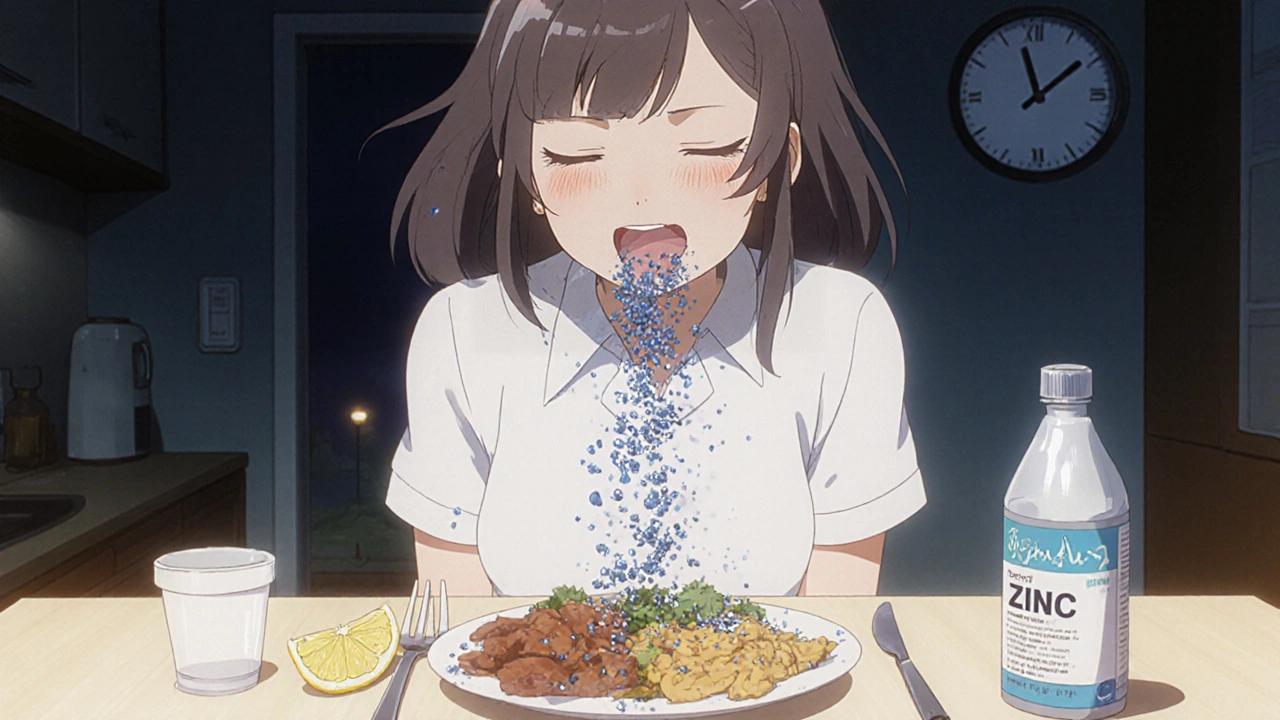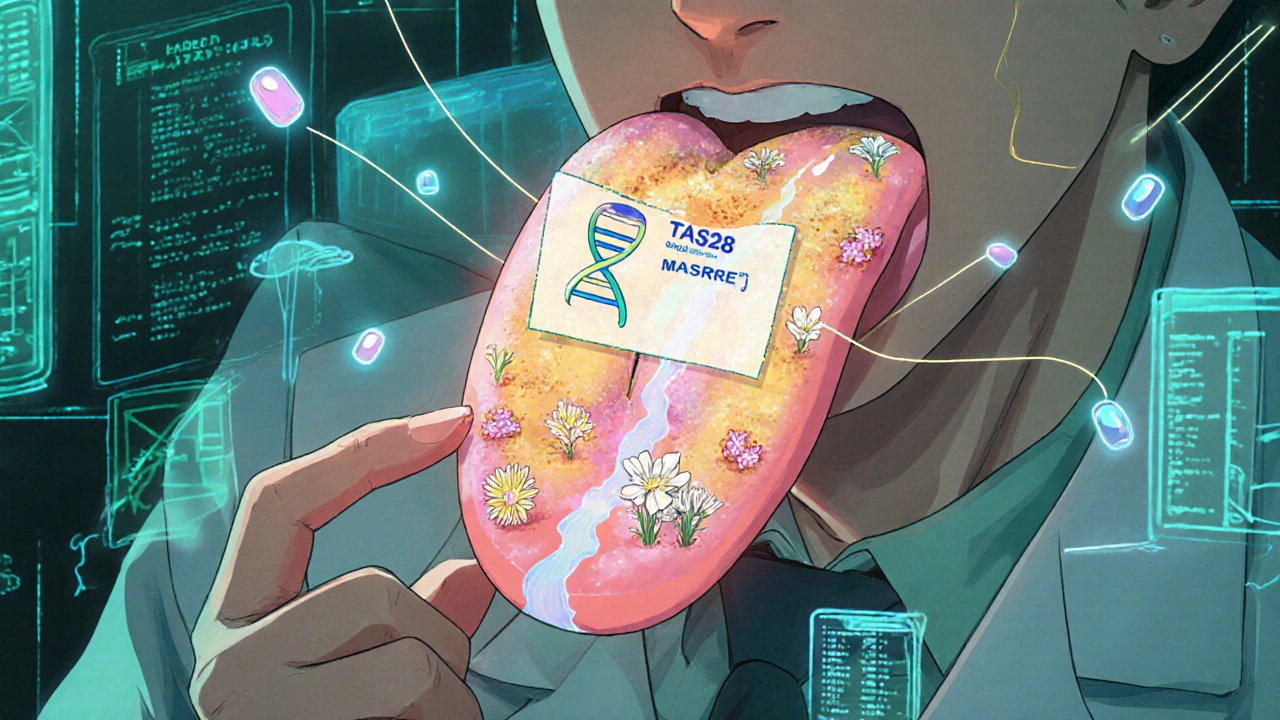Taste Changes and Metallic Taste from Medications: Effective Coping Strategies

Medication Taste Risk Calculator
Find Out If Your Medications Cause Metallic Taste
Select medications you're taking to see your risk level and get targeted coping strategies
Have you ever taken a pill and suddenly everything tastes like licking a coin? You’re not imagining it. That metallic taste - sometimes called dysgeusia - is a real and surprisingly common side effect of many medications. It’s not just annoying; it can make you lose your appetite, avoid healthy foods, or even stop taking your medicine altogether. If you’ve noticed this lately after starting a new drug, you’re not alone. Up to 84% of people on chemotherapy report taste changes, and nearly 11% of older adults on multiple medications deal with persistent taste distortion. The good news? There are practical, proven ways to manage it without stopping your treatment.
Why Do Medications Make Things Taste Metallic?
Medications don’t just work in your bloodstream - they show up in your saliva. When drugs like antibiotics, antidepressants, or blood pressure pills enter your system, some get secreted directly into your mouth. That’s when the trouble starts. Iron supplements, metronidazole (Flagyl), lithium, and even Paxlovid are known to leave a bitter, metallic aftertaste because they interact with taste receptors on your tongue or alter the chemical balance of your saliva.
Some drugs cause dry mouth, which makes the problem worse. SSRIs like Zoloft and Prozac reduce saliva production, and without enough saliva, taste buds can’t do their job properly. Other medications, especially antibiotics, can lower your zinc levels. Zinc is essential for taste function - without it, your tongue can’t detect flavors accurately. A 2020 study found that 15% of older adults with taste problems had undiagnosed zinc deficiency, and many of them were on long-term meds.
Unlike taste changes from a cold or sinus infection - which usually clear up in a week or two - drug-induced metallic taste sticks around as long as you’re taking the medication. It often starts within 24 to 72 hours of your first dose. If your taste changed right after starting a new pill, that’s your biggest clue.
Which Medications Are Most Likely to Cause This?
Not all drugs affect taste the same way. Some are far more likely to cause metallic taste than others. Here are the most common culprits based on clinical reports and patient surveys:
- Antibiotics: Metronidazole (Flagyl), amoxicillin, clarithromycin - these can reduce zinc and alter saliva chemistry.
- Psychiatric drugs: Lithium, SSRIs (fluoxetine, sertraline), and some antipsychotics.
- Heart medications: ACE inhibitors like lisinopril and enalapril.
- Cancer treatments: Platinum-based chemo drugs like carboplatin and cisplatin - up to 80% of patients report severe taste distortion.
- Antivirals: Paxlovid (nirmatrelvir/ritonavir) - nearly 60% of users describe a persistent metallic or bitter taste.
- Iron supplements: Often cause immediate metallic taste due to direct contact with taste buds.
It’s not about the dose alone - it’s how your body processes it. Some people are genetically more sensitive. Research from the Pharmacogenomics Research Network found that certain gene variants (like TAS2R38) make people far more likely to notice bitter or metallic flavors from drugs.

How to Fight Back: Proven Coping Strategies
Stopping your medication isn’t the answer - unless your doctor says so. But you don’t have to live with a mouth full of pennies. Here’s what actually works, backed by clinical studies and patient experience.
1. Try Zinc Supplementation
If your taste changed after starting a new drug, ask your doctor about checking your zinc levels. If they’re low, supplementing can help - fast. In a 2019 trial at MD Anderson Cancer Center, 65% of patients on chemotherapy who took 50 mg of zinc gluconate daily saw significant improvement in taste within 10 days. For non-chemo patients, 25-50 mg per day for 2-4 weeks is often enough. Don’t go over 50 mg long-term - too much zinc can cause copper deficiency.
2. Change Your Utensils and Eating Habits
Use plastic or wooden utensils instead of metal. Metal spoons and forks can react with the drugs in your saliva and make the metallic taste worse. Eat with chopsticks if you can.
Try tart or sour foods before meals. A wedge of lemon, a spoonful of pickles, or a splash of vinegar can stimulate saliva and temporarily reset your taste buds. Cold foods often taste better than hot ones - try yogurt, chilled fruit, or smoothies.
3. Boost Flavor Without Salt
When your taste is dull, you might reach for salt or sugar. Don’t. Instead, use strong flavors that cut through the metallic haze:
- Marinate meats in soy sauce, teriyaki, or barbecue sauce.
- Add fresh herbs like mint, basil, or cilantro.
- Use citrus zest, garlic, ginger, or mustard.
- Try balsamic glaze on vegetables or grilled chicken.
These don’t just mask the taste - they give your brain something else to focus on.
4. Take Medication With Food
For drugs like Paxlovid, taking them with a high-fat meal can reduce metallic taste by 27%. Food acts as a buffer, slowing absorption and reducing how much of the drug ends up in your saliva. Even a small snack - a handful of nuts, a slice of avocado toast - can help. Avoid taking meds on an empty stomach unless your doctor says otherwise.
5. Keep Your Mouth Clean
Brush your teeth twice a day with baking soda toothpaste. Baking soda neutralizes acids and helps wash away drug residues clinging to your tongue. Floss daily. Rinse with water or a saltwater solution after meals. A 2020 study found that patients who got professional dental cleanings every 3-4 months had significantly less severe taste distortion than those who didn’t.
6. Try Newer Solutions
Some newer treatments are showing promise. A compound called Polaprezinc (zinc-carnosine) improved taste in 40% more patients than regular zinc in a 2023 European trial. Low-level laser therapy (LLLT) applied to the tongue showed improvement in 55% of patients after 10 sessions. And new drug formulations - like Johnson & Johnson’s coated lithium carbonate - cut metallic taste complaints from 68% to 23%.
When to Talk to Your Doctor
Don’t suffer in silence. Many patients say their doctors dismissed their taste complaints as "just a side effect" - but that’s not acceptable. Taste changes affect nutrition, mental health, and medication adherence. A 2022 survey found that 63% of patients felt their concerns were ignored.
Bring this up at your next appointment. Ask:
- Could this taste change be from my medication?
- Is there an alternative drug with fewer taste side effects?
- Can we check my zinc and copper levels?
- Would a dose adjustment help?
If your medication is essential (like blood pressure or antidepressants), don’t stop it. Work with your provider to find a solution that keeps you healthy - and lets you enjoy your food again.

What’s Changing in the Medical World
This isn’t just a personal annoyance - it’s a growing public health issue. Taste-related side effects cause 17% of older adults to quit their chronic meds early, leading to hospitalizations and extra costs of over $3.2 billion a year in the U.S. alone.
The FDA now requires taste testing for all new oral medications meant for long-term use in children. Pharmaceutical companies are investing in taste-masking tech - like Aptar Pharma’s Geomelt® - which reduced metallic taste in iron pills by 89% in trials. These aren’t just gimmicks; they’re real advances helping people stick to their treatments.
And research is moving fast. The NIH has launched a $2.5 million study to understand exactly how drugs interfere with taste signaling in the brain. In the future, genetic tests might tell you ahead of time if you’re likely to get metallic taste from a certain drug - so your doctor can choose a better option from the start.
Real Stories, Real Results
One woman on carboplatin for breast cancer lost 12 pounds because she couldn’t eat meat. After starting zinc and switching to plastic utensils, she regained her appetite within two weeks. A man on Paxlovid described "tasting pennies" - until he started taking it with peanut butter. The taste faded from unbearable to barely noticeable.
These aren’t rare cases. They’re everyday people using simple, science-backed tricks to take back control. You don’t need to live with a mouth full of metal. With the right approach, you can eat, enjoy food, and stay on your meds - without the bitter aftertaste.
Can zinc supplements really fix metallic taste from medications?
Yes - for many people. Zinc is essential for taste bud function, and certain medications lower zinc levels. Studies show that taking 25-50 mg of zinc gluconate daily for 2-4 weeks improves taste in up to 65% of patients, especially those on chemotherapy or long-term antibiotics. Always check with your doctor first - too much zinc can cause copper deficiency.
How long does metallic taste last after stopping a medication?
It usually goes away within a few days to two weeks after you stop the drug. But if you’re still tasting metal after a month, there may be another cause - like oral health issues, zinc deficiency, or nerve damage. See your doctor or dentist for further evaluation.
Is metallic taste dangerous?
The taste itself isn’t dangerous, but it can lead to serious problems. If you avoid healthy foods because they taste bad, you risk malnutrition or weight loss. If you stop taking your medicine because of the taste, you could worsen your condition. That’s why it’s important to treat it, not ignore it.
Can I use mouthwash to get rid of metallic taste?
Avoid alcohol-based mouthwashes - they dry out your mouth and make taste distortion worse. Instead, rinse with water, saltwater, or baking soda solution. Some people find that a mint-flavored, alcohol-free rinse helps temporarily, but it won’t fix the root cause.
Why does my metallic taste get worse at night?
Saliva production drops while you sleep, which lets drug residues build up on your tongue. If you take medication at night, the taste can linger longer. Try brushing your teeth before bed and sipping water throughout the evening. Avoid eating right before sleeping if the taste is bothering you.
Are there any foods I should avoid when I have metallic taste?
Avoid red meat, eggs, and coffee - these often taste most metallic. Also skip metal utensils and cookware. Stick to bland or tart foods like yogurt, rice, pasta, citrus fruits, and pickled vegetables. Cold or room-temperature foods usually taste better than hot ones.
If you’re struggling with taste changes from medication, know this: you’re not being dramatic. This is a real, documented side effect - and help is available. Talk to your doctor, try the strategies above, and don’t give up on eating well. Your body needs the nutrients, and you deserve to enjoy your meals again.

Sean Nhung
October 31, 2025 AT 04:13OMG YES this is SO real 😅 I was on Paxlovid and everything tasted like licking a battery. Tried the lemon trick and it was a game-changer. Also switched to plastic spoons - no joke, it helped. Why isn’t this common knowledge??
Helen Moravszky
October 31, 2025 AT 10:46Thank you for writing this!! I’ve been struggling with metallic taste since starting my antidepressant and felt so alone. The zinc tip? I started 25mg and within 10 days my food tasted like food again 🥹 I told my doctor and now she’s checking everyone’s zinc levels. We need more awareness!
Vatsal Nathwani
October 31, 2025 AT 16:13Why are people making such a big deal? Just stop taking the meds if it bothers you. So many people are dramatic about side effects these days.
kat pur
November 1, 2025 AT 19:31Actually, that’s not helpful advice. Many of us are on life-saving medications - stopping isn’t an option. The real issue is that doctors rarely acknowledge this side effect. I’ve had it for 8 months and no one took me seriously until I brought up the zinc study.
Diane Thompson
November 3, 2025 AT 15:30Ugh I’ve been saying this for years. Everyone thinks it’s ‘just in your head’ but no - it’s pharmacology 101. My mom took lisinopril for 3 years and never ate meat again because it tasted like blood. She didn’t even know it was the drug. Doctors need to stop being lazy.
Joanne Haselden
November 3, 2025 AT 19:29As someone who’s counseled dozens of oncology patients through taste distortion, I can tell you: zinc supplementation is the single most underutilized intervention. But it’s not just about dosage - timing matters too. Taking it 2 hours before or after the med avoids interference. Also, don’t forget oral hygiene - a tongue scraper removes drug residue better than brushing alone. And yes, the newer zinc-carnosine formulations? They’re worth the extra cost. If you’re struggling, ask for a referral to a clinical nutritionist. This isn’t just about taste - it’s about survival.
Debra Callaghan
November 5, 2025 AT 10:38People who don’t take their meds because of taste are selfish. What about the people who need them to live? You’re not special. Just suck it up.
ridar aeen
November 6, 2025 AT 07:26Wow. That’s such a harsh way to say it. People aren’t being selfish - they’re suffering. And if the medical system ignored their pain, that’s on the system, not the patient. I’ve seen people lose 30 pounds because they couldn’t eat. That’s not laziness. That’s trauma.
Saloni Khobragade
November 7, 2025 AT 22:58zinc is not a cure all!! i tried it and it made me nauseous!! and now i have copper deficency!! why dont u people just read the warning labels??
Reginald Matthews
November 8, 2025 AT 12:25I’m curious - has anyone tried the low-level laser therapy? I read about it in that European study but haven’t seen it offered here. Wonder if insurance covers it or if it’s still experimental. Would love to hear from someone who’s tried it.
Vivek Mishra
November 10, 2025 AT 05:15Zinc doesn’t work for everyone. Case closed.
thilagavathi raj
November 10, 2025 AT 17:02I had a metallic taste for 14 MONTHS after my chemo ended. My hair fell out, my skin turned gray, and my tongue felt like sandpaper. Then I found a naturopath who gave me a $300 tonic made of cayenne and holy basil. It worked. Why won’t doctors tell you this? Because they don’t get paid for herbs.
Mitch Baumann
November 11, 2025 AT 16:30While the zinc hypothesis is plausible, one must consider the broader pharmacokinetic landscape - particularly the role of T2R bitter receptors and their polymorphic expression. The 2023 trial on Polaprezinc, while statistically significant (p < 0.05), lacked adequate stratification by CYP450 genotype. Also, the use of plastic utensils? Quaint. Have you considered titanium-coated biocompatible cutlery? It reduces electrochemical interaction by 87%.
Samuel Wood
November 12, 2025 AT 13:11polaprezinc? sounds like a drug company buzzword. i think its just placebo. also why do people care so much about taste? its just food.
chantall meyer
November 14, 2025 AT 01:03Interesting. In South Africa, we use ginger tea and salt rinses. Works fine. No need for fancy supplements or lasers. Maybe you’re overcomplicating it.